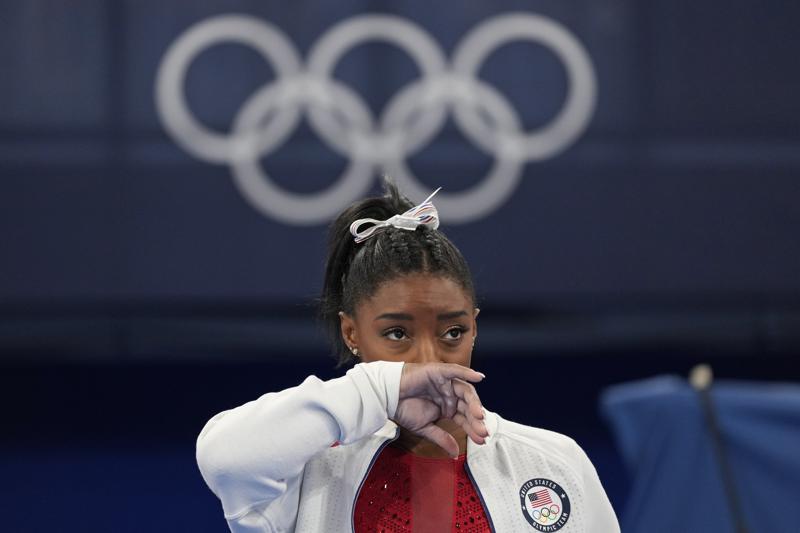Photo by Ashley Landis / AP.
For Your Edification* is a weekly Slice of Culture series where staff writer Ed Daniel take topics — Hudson County or national news related — and provides social commentary.
The withdrawal of Simone Biles in competition at the Tokyo Olympic Games requires a discourse about mental health among athletes and the grace we provide them.
Biles, an Olympic champion, gymnast and superstar, withdrew earlier this week from individual all-around competition in the Olympic games to focus on her mental health.
The decision came after Biles forced herself out of the team final after just one rotation. She said her “mind and body are simply not in sync.”
She recently has been plagued with the “twisties” — a gymnastic term and phenomenon that describes a gymnast getting lost in the air. This can cause very serious injuries when gymnasts perform airbourne routines and takes awhile for gymnasts to get over the symptoms.
But Biles still has a chance to return and win gold; she has qualified for all four event titles later in the games. She said she will regroup before she decides to continue.
The question is should she have to?
In a recent interview with NBC’s Hoda Kotb, she said:
“If there weren’t a remaining survivor in the sport, they would’ve just brushed it to the side.”
Per USA Today, in August 2016, an IndyStar investigation found top executives at USA Gymnastics had failed to alert authorities to many allegations of sexual abuse by coaches.
Two women came forward with allegations against former USA Gymnastics team doctor Larry Nassar. More women shared their stories over the next few months, and Nassar was criminally charged.
But IndyStar’s investigation revealed, as of late 2016, at least 368 gymnasts had alleged some form of sexual abuse by their coaches, gym owners and other adults working in the sport.
Biles was not a hero for withdrawing from competition. She is a hero because she is a survivor of Nassar, a widespread sexual abuser, and continued to not only compete, but be excellent in the world in which she and her abuser were introduced.
Biles doesn’t have to put her hands on a beam again and she’d still be revered because she used her vulnerability to push an important conversation into the public sphere.
Those are the reasons why she should be considered heroic. But heroism and dominance should not be a requirement to provide grace for those who are in need of it.
Social media was ablaze when the news broke out. She received a lot of support, but also some unfair criticism.
Texas Deputy Attorney General Aaron Reitz called Biles a “national embarrassment” then pulled an about face by quickly apologizing afterward.
Biles, a native of Spring, Texas, is the farthest thing from a national embarrassment.
Her combined 30 Olympic and World Champion medals destroys any argument of that.
Biles is extremely exceptional at her craft. More so than any politician that calls her an embarrassment or a comedian that makes a bad joke at her expense (Michael Che of “Saturday Night Live”).
Her decision to withdraw is more so something useful and valuable in everyday life — maturity. She acknowledged that her head was not in the right state of mind to compete at this level and decided that she was not going to risk hurting her team and, more importantly, herself.
The closest real life example I can think of to compare is NBA legend Michael Jordan’s first retirement in 1993.
Jordan retired in the fall of that year after winning an NBA championship and claimed that he lost the desire to play basketball and that his decision was also influenced by the murder of his father three months earlier. He came back in 1995.
Jordan was not only known for his skill, but his fierce competitiveness too. If he felt that he needed a break, that would make him weak minded.
In the age of social media, I wonder what the conversation would look like about Jordan’s decision, a player who many hold as the greatest of all time.
Now let’s try a hypothetical analogy.
Let’s say six-time Superbowl Champion Tom Brady tells the country — before his team plays in the NFL playoffs — that he needs to take time off because he is not mentally well and could not participate in fierce competition.
A lot of people would have a hard time with this because the general public doesn’t understand and cannot quantify mental health.
We can see when someone is physically unable to play due to a torn ACL, bad ankle or shoulder injury, but it’s hard to know what goes on in someone’s head. It requires a level of empathy because everyone is unique in how they absorb trauma and stress.
But Bile’s case is even more unique.
Imagine the trauma, anxiety and stress that she is possibly triggered with any time she performs or practices her sport. She is a hero because she is an advocate for victims of sexual assault.
Biles’ actions require us to think beyond ourselves and trust that this incredibly accomplished athlete is unable to perform, not because of physical limitations, but because of an asset that is unique to her and any living person on this planet: her mind.
If you want Ed to tackle a specific topic please email hello@sliceofculture and edaniel@sliceofculture.com.


